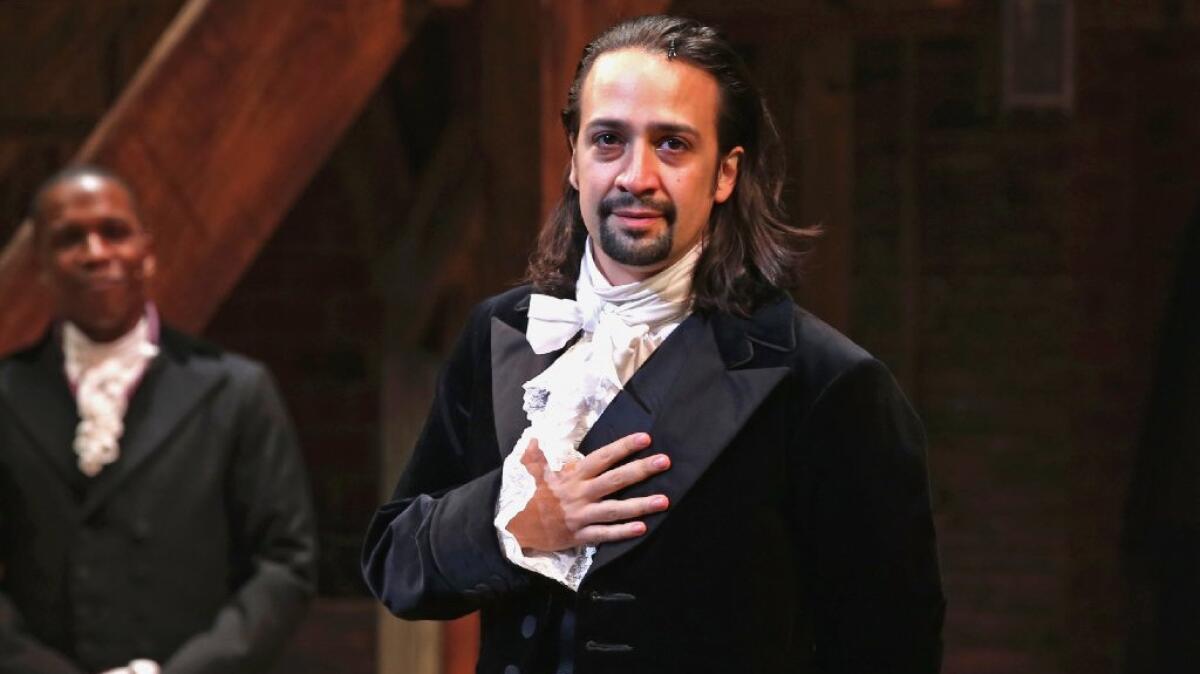Column: The emotional hooks of ‘Hamilton’: Why the soundtrack makes me cry every single time

According to iTunes, I have listened to the “Hamilton” original Broadway cast recording something like 40 times since I bought it in March, after Lin-Manuel Miranda and Co. accepted the Grammy for musical theater album. And I have cried every single time. Every. Single. Time.
If you were to ask my friends to describe me, few of them would say, “Oh, that dude sheds tears at everything.” No one has ever accused me of being prone to fits of emotions. Not that I’m a Vulcan, I can just hold it together — unless it’s the end of “Glory,” “The Iron Giant” or the Thanksgiving episode of “The West Wing.”
So I find myself wondering why this show affects me so — a show that, mind you, I’ve never seen in person, given that I live in Los Angeles and “Hamilton” is where “Hamilton” is. And at this point it’s probably better I don’t see “Hamilton,” lest the players become distracted by the idiot snurfling in the mezzanine. Because these tears aren’t solemn, roll-a-single-drop-for-the-fallen tears. They are, oh-God-I-think-I’m-going-to-crash-my-car-because-everything’s-blurry-and-there’s-snot-everywhere tears. Ugly crying, every time, during my commute.
See the most-read stories in Entertainment this hour >>
As a kid who was born in the same place and, loosely, the same time as hip-hop itself, seeing the form — with its roots in slavery, its lifeblood the songs of caged birds — deployed to such knowing and devastating effect is a thing to see. Rap is the voice of youthful, untempered passion and so the young revolutionaries of Miranda’s tale — Alexander Hamilton, Marquis de Lafayette, John Laurens and Hercules Mulligan — deliver their treatises in flow after flow of Fleet Street verse. As those men get older, their predisposition to rap fades — save Hamilton, who can summon that young-man’s vigor when provoked, like an old dog who will still rear up when poked.
If it weren’t enough that Miranda wrote enough rhymes to fill a phone book, he gives each of those men their own styles. Hamilton is the ahead-of-his-time genius who drops couplets and quatrains like Eminem or Rakim. Lafayette is all speed and brio, like Twista or Yelawolf. Laurens is a straight-down-the-middle Ad Rock, nimble and able. And Mulligan is what it’d sound like if Busta Rhymes were possessed by the Big Bad Wolf.
And when Miranda isn’t using his protean brain like the hammer of the gods, forging rhyme schemes that cut like folded steel on tracks like “My Shot,” “Guns and Ships” and the “Cabinet Battle” songs, he’s wielding that hammer like a glassblower, tapping out intricate, crystalline gems of songs like “Satisfied,” “Wait for It” and “Burn.”
All in service of a story that I shouldn’t care about because America has, until now, not decided that I should. The story of Alexander Hamilton was never distilled for me the way Miranda does it. If any of my teachers had thought to unfurl Hamilton’s life as the tragedy of a brilliant orphan who uses the written word, a prodigious gift for finance and what must’ve been an uncomfortably large set of personal flaws to rise from obscurity to the pinnacle of American society, then I would’ve cared. But they didn’t, so neither did I.
And yet, that doesn’t really explain it. All of those reasons, while valid, don’t explain why this Broadway musical — a form that I appreciate but had never truly responded to — strikes a chord within me that I can’t quite silence. At least before I start weeping.
No. It’s that “Hamilton” is about a kid from the Caribbean who comes to New York City to find his future. My father was a kid from the Caribbean who came to New York to find his future. He was born in Haiti, the poorest country in the Western Hemisphere, and he came to New York with nothing but a talent for mathematics — a language without barriers — which he channeled into accounting, and a hunger to forge his path in the world.
I, on the other hand, hail from the Bronx, not far from the Washington Heights neighborhood where Miranda was born to Puerto Rican parents. Both the playwright and I are a generation removed from the islands of our fathers. Where my dad’s way out was numbers, mine was, and remains, the written word. I am keenly aware of the fact that, were you to consult the actuarial tables for black men born in 1971 in the Bronx, I have likely exceeded my life expectancy. I should be dead, or in jail, but I’m not. Instead, I write for television and comic books and, yes, for the Los Angeles Times.
“Hamilton” follows a man who fused the literary and the financial — and it is the first time I have seen myself, and my father before me, in a work of art.
Immigrants, we get the job done.
Sniff.
ALSO
Tony Awards 2016: The complete list of nominees
And the winner is ... the ensemble cast: How Broadway’s best acting was a group effort
Is ‘Hamilton’ the top Broadway musical of all time? Not necessarily, this expert says
Sheldon Harnick, ‘Fiddler’ and ‘She Loves Me’ lyricist, sails back into the Tony spotlight at 92
More to Read
The biggest entertainment stories
Get our big stories about Hollywood, film, television, music, arts, culture and more right in your inbox as soon as they publish.
You may occasionally receive promotional content from the Los Angeles Times.











